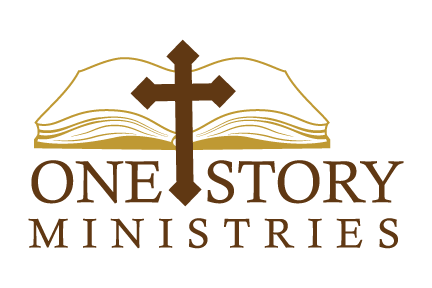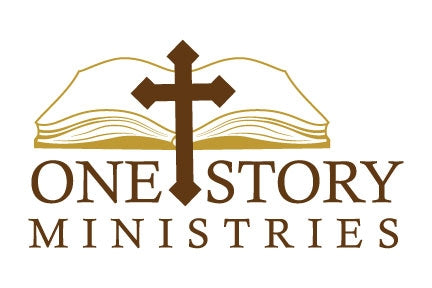Children's Sunday School
Investigating God’s Word...
is a seven year, comprehensive, Christ-centered Sunday School curriculum for Kindergarten through sixth grade. The curriculum covers all of God’s Word, from Genesis to Revelation, in a systematic way. Each quarter includes 13 lessons for a total of 52 weeks each year.
Curriculum by Year
-
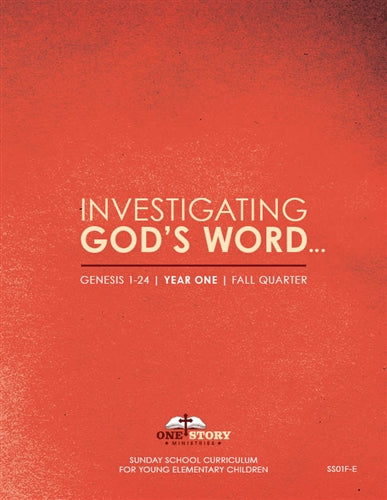
Children's Sunday School Year One
Investigating God’s Word Year One is our Children’s Sunday School curriculum designed...
-
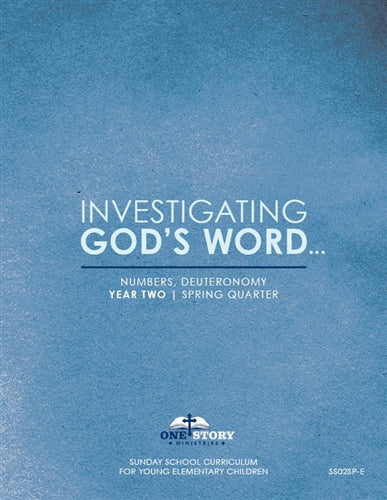
Children's Sunday School Year Two
Investigating God’s Word Year Two is our Children’s Sunday School curriculum designed...
-
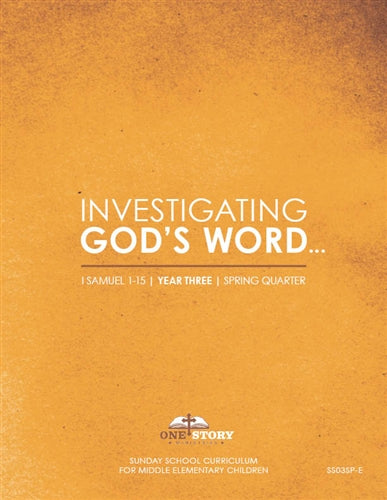
Children's Sunday School Year Three
Investigating God’s Word Year Three is our Children’s Sunday School curriculum designed...
-
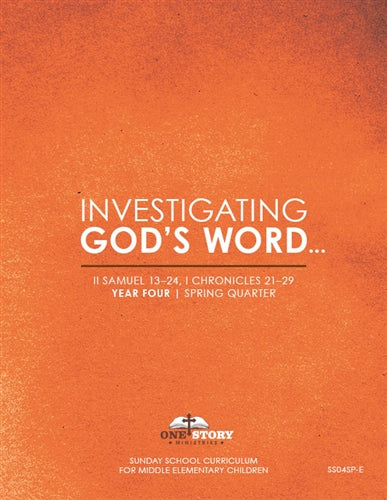
Children's Sunday School Year Four
Investigating God’s Word Year Four is our Children’s Sunday School curriculum designed...
-
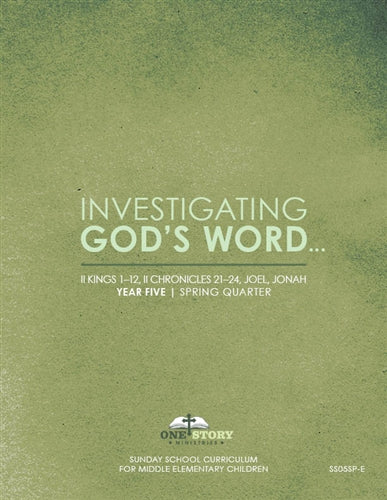
Children's Sunday School Year Five
Investigating God’s Word Year Five is our Children’s Sunday School curriculum designed...
-
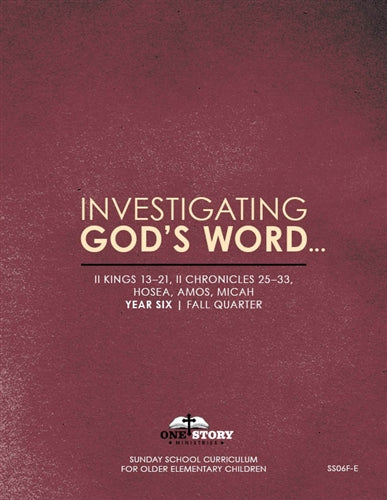
Children's Sunday School Year Six
Investigating God’s Word Year Six is our Children’s Sunday School curriculum designed...
-
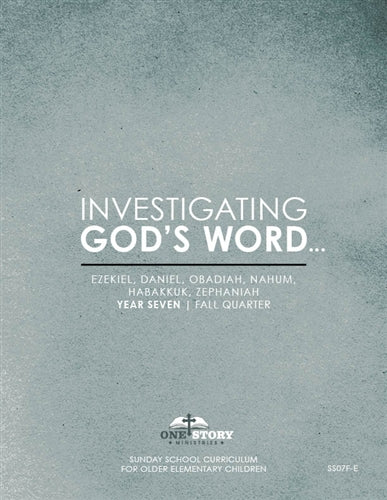
Children's Sunday School Year Seven
Investigating God’s Word Year Seven is our Children’s Sunday School curriculum designed...
Curriculum Distinctives
-
It’s All About God
We believe that the Bible has been given to us first and foremost to teach us about God. God is the main character of every story and the focal point of all instruction. “What does this teach us about God?” is the question by which God’s Word must be studied. All other characters of the stories of Scripture are secondary to God. Our curriculum is neither man-centered nor moralistic in its approach.
-
It Covers All of God’s Word
ALL Scripture is inspired by God and ALL Scripture is profitable for teaching, reproof, correction and training in righteous (2 Timothy 3:16). Based on that truth, we believe our children should be taught the entirety of Scripture, from Genesis to Revelation. Where other curricula teach the same 30-40 “major” stories of Scripture, our curriculum covers all of God’s Word over a period of seven years. We believe that the same gospel truths repeat over and over again in the Bible, which frees us to investigate almost all of God’s Word rather than simply repeating the same stories each year.
-
It Connects Everything Chronologically
When other curricula teach the Bible as a series of disconnected stories, we teach God’s Word as history. Therefore, our curriculum presents God’s Word chronologically, demonstrating how all the stories and teaching of Scripture connect to one another historically. Each year, the children typically study two quarters in the Old Testament and two quarters in the New Testament, moving in parallel from Genesis to Revelation (See scope and sequence). Our curriculum, then, is not grouped by themes or subject matter like other materials, desiring to see children study through the Bible book by book.
-
It’s Centered on Christ
We believe that all Scripture, in both the Old and New Testaments, has Christ as the central focal point. With that in mind, we teach all the stories of Scripture to children with clear reference to Christ. Each lesson should direct our minds to what we learn about who Christ is, why we need Christ, and what it means to be Christ’s disciple. In other words, the gospel of our Lord Jesus Christ is taught as the children study from Genesis to Revelation.
-
Conversational Method
The methodology of our curriculum is the verbal transmission of God’s Word. Teachers converse in a highly interactive way with their students about God’s Word. Scripture is read, questions are asked, discussion is engaged, and application is made. Within this process, students learn to investigate God’s Word—observing, comprehending, interpreting and applying it. It is our desire to see children learn God’s Word AND learn how to study it for themselves.
-
Easy to Teach
Our curriculum is a clear and organized scripted lesson plan, making it easy to prepare and present. The main preparation is of the heart! Teachers are not given multiple options or extra activities to put together. This allows the focus to truly be on God’s Word, as it has the power to change the hearts of our children. Our teachers testify to learning along with the children as they investigate God’s Word together!
Lesson Components

PART ONE
Lesson Overview and Teacher Encouragement
The first page of each lesson includes a summary of the section of Scripture being studied as well as some words of encouragement for the teacher. A suggested schedule for the class is included in the sidebar. Teachers get an overall view of what they will be teaching and some Biblical motivation to teach God’s Word with passion!

PART TWO
Welcome
Each lesson begins with a welcome which introduces the student to the day’s study. We like to think of it as a “call to study.” The WELCOME section may be a thought question (in the younger grades) or a verse or two from the Psalms and Proverbs (older grades) that specifically calls us to focus our minds on the study of God’s Word.

PArt Three
Drill Time
The DRILL TIME is the weekly opportunity for the students to be quizzed on what they have learned in the past. Sometimes, the questions come from the week before. Often times, the questions are from other parts of Scripture that demonstrate the connectedness of all of God’s Word. The DRILL TIME helps to ensure that our children are reminded of stories that they have learned in the past.
Part Four
W.O.W. Word
The W.O.W! is our Word of the Week. This component is vital in order to begin the building of our children’s Christian vocabularies. The W.O.W! is most often found in the text itself. Sometimes, the W.O.W! is an essential theological word that is taught in the text. Either way, the Word of the Week is a great memory tool to help children remember what they learned from God’s Word that day.
Part Five
Historical Context
This section is included to regularly train the children to understand that the Bible is real history, not disconnected stories. A timeline is included in the lesson for the teacher to put on the board and discuss. The children learn the context of the story in history as they come to appreciate the chronologies of all stories, events, and writings of the Bible.

Part Six
Bible Investigation
This time is the heart and soul of the weekly lesson. God’s Word is read straight from the New International Version text itself (not a paraphrase), and then observed, discussed and applied. After each portion of Scripture, questions are asked of the text to get the children interacting with it. Application is not left until the end of the lesson, but interwoven throughout the Bible Investigation time. Children are taught to think about the text, answer questions about it and discuss it together. The goal is not just for the children to take away one big truth or theme, but to be exposed to a myriad of truths that help them learn more about God.
Part Seven
Lesson-At-Home
At the end of each lesson, the students are taught a Scripture memory verse. This memory verse either comes directly from the text being studied or connects to the truths of the lesson from another part of Scripture. The children are sent home with a bookmark that includes the Scripture Memory as well as a short list of phrases that describe aspects of the lesson. The children are encouraged to share the lesson in their homes, and parents can use the cards to converse with their children about what they learned.
Curriculum FAQs
What version of the Bible is used in the Sunday School curriculum?
The English Standard Version (ESV) and the New International Version 84 (NIV).
Why is the curriculum divided up into years rather than grades?
The curriculum is designed to be used for Kindergarten through sixth grade.But rather than dividing them into grades, we chose to put them into more generic “years” for greater flexibility and broader use. More importantly, this allows you to use the curriculum for classrooms of multiple grades, rotating years as needed.
What about visual aids for younger children?
Felt figures are available for Year One and Year Two.
What handouts are included with the Sunday School curriculum?
“Lesson-At-Home” bookmarks are available for each lesson for you to send home with the children.These are included in the purchase of your curriculum as downloadable PDF files.In this electronic format, you can make as many copies of the bookmarks as you wish on card stock, never having to purchase new bookmarks year after year.
Your Sunday School curriculum seems more expensive than others. Why is that?
Our Sunday School curriculum is printed on high quality, mylar reinforced paper and put into long lasting three-ring binders in order for you to use them year after year.So, while most Sunday School curricula is consumable, it is our hope that you can use these volumes for several years without the need for replacements.Also, with our curriculum, there are no consumable workbooks or worksheets for you to buy each year for each child.So, in the long run, you will end up saving moneyby not having to buy more material each year.
Do you plan to publish the curriculum in other Bible versions?
Not at this time.
Can we make copies of Sunday School lessons?
Individual lessons may be copied for single use, such as for substitute teachers.The curriculum is copyrighted and may not be copied into complete books.
Bookmarks
These bookmarks are for use with our Investigating God's Word... Children's Sunday School curriculum. Simply download and print on card stock. They come 4 to a page and can be downloaded in color or in black and white.
